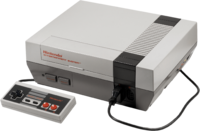From NintendoWiki, your source on Nintendo information. By fans, for fans.
Nintendo Entertainment System
|
|
|
| No. of games
|
708 (Licensed)
113 (Unlicensed)
821 (Total)
|
| No. of launch titles
|
|
| Best-selling game
|
Super Mario Bros. (40.24 million copies)
|
| Last game
|
Disney's Aladdin (May 20, 1995)
|
|
|
| Media
|
Nintendo Entertainment System Game Pak
|
| Storage capacity
|
N/A
|
| CPU
|
Ricoh 2A03 8-bit processor
|
| Model no.
|
NES-001
|
|
|
|
| Launch date
|
- JP - July 15, 1983
- NA - October 18, 1985
- EU (FR, NL, DE, NO, DK, SE) September 1, 1986
- EU (UK, IE, IT)/AUS 1987
|
| Discontinue date
|
1995
|
| Units sold
|
{{{sold}}}
|
|
|
|
The Nintendo Entertainment System (ファミコン, Famikon, Famicom), commonly abbreviated as NES or Nintendo, is the first home gaming console that was manufactured by Nintendo. It was the system that saved the industry after the Great fall of video games of 1983. It was the first home console that Nintendo sold worldwide. In South Korea the console was known as the Comboy, and was distributed by Hyundai Electronics.
The NES debuted in Japan as the Famicom (Family Computer) in 1983. After selling over 2.5 million units by the end of 1984, Nintendo decided it would bring its console to North America. They first tried negotiating with Atari to have them release it, but the deal fell through, so Nintendo decided that they would release the console themselves.
The Famicom was difficult to pitch to retailers due to the current video game market being oversaturated with poor titles and low consumer interest. After tweaking the system a few times, Nintendo finally pitched the console as the Nintendo Entertainment System and emphasized its toy-like features such as the Robot Operating Buddy (R.O.B.) and the Zapper light gun. Retailers finally began to take interest and the system debuted in test markets in New York City and Los Angeles before eventually being released all across the United States.
The NES grew to wide success, outselling all of its competitors and leading the worldwide video game market. Many NES games are considered classics today, such as Super Mario Bros., Duck Hunt, and The Legend of Zelda.
In America, the NES was sold in four packages:
- Deluxe Set: This set included the console, two controllers, the Zapper, Robotic Operating Buddy, the Duck Hunt and Gyromite games, Gyromite accessories, and the needed connections.
- Control Deck: Contained the console, two controllers and the needed connections.
- Action Set: This set included the console, two controllers, the Super Mario Bros./Duck Hunt cartridge, the Zapper, and the connections.
- Power Set: The most complete package, it contained the console, two controllers, a Super Mario Bros./Duck Hunt/World Class Track Meet cartridge, the Zapper, the Power Pad and the connections.
Gradually, the competition began to catch up and the next generation of home consoles, such as the SEGA Genesis and Nintendo's own Super Nintendo Entertainment System, began to overtake the NES's market share. Finally, after a full decade of production, the NES was formally discontinued in the U.S. in 1995. By this time, over 60 million units and over 500 million games had been sold throughout the world.
Accessories
List of NES Accessories
List of NES Controllers
External links
|
|
| Controllers
|
|
| Add-on devices
|
|
|
|
|
|
|
|
|
| Other
|
| Standalone consoles
|
Arcade
|
Pokémon
|
Classics
|
Cancelled
|
|
|
|
|
|
|
|



